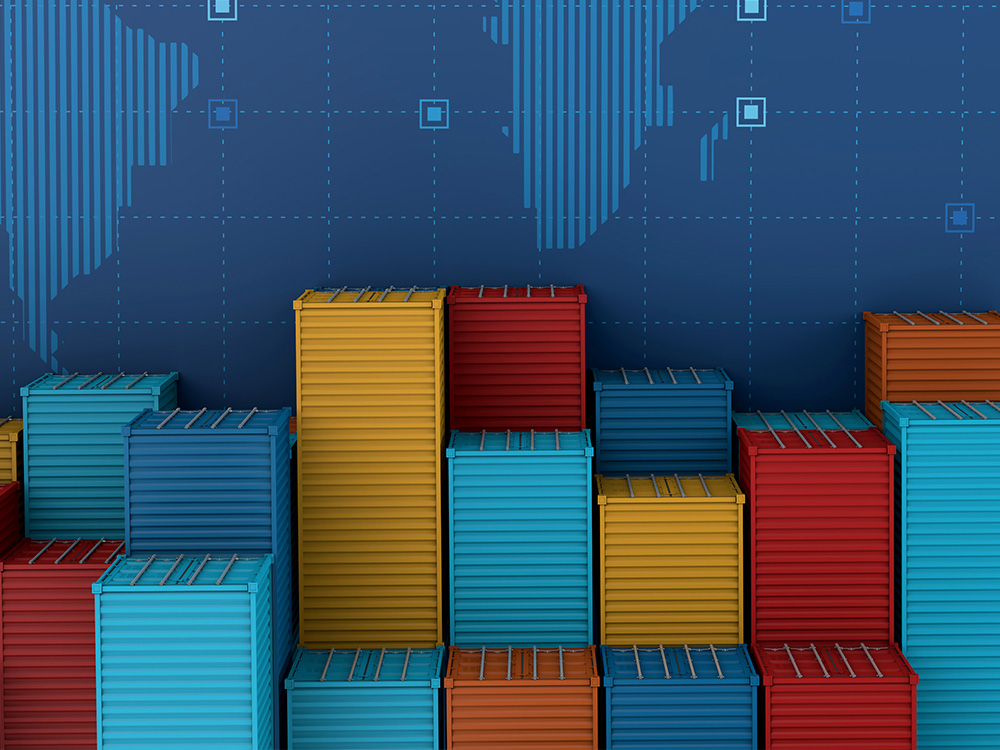Insights > Newsletters
Newsletters
International Trade and Customs Newsletter – No. 3
May 23rd, 2023

The International Trade Newsletter aims to provide information about recent news, trends and government guidelines in Brazil and abroad regarding trade, market access, trade remedies, import tariffs and competitiveness. This material is for informational purposes and should not be used for decision-making. Specific legal advice can be provided by our lawyers.
Enjoy reading!
International Trade Team
International Trade and Sustainability – Latest Updates
On May 10, 2023, the European Union (“EU”) published Regulation (EU) 2023/956, a new rule that established the Carbon Border Adjustment Mechanism (“CBAM”).
This measure aims to regulate carbon emissions resulting from certain EU imports and introduces several new requirements to allow access to the European market for such imported products, including mandatory purchases of CBAM certificates.
The CBAM encompasses the following industries:
- Cement
- Electricity
- Fertilizers
- Iron and steel
- Aluminum
- Hydrogen
The transition period is set to commence in October 2023, which is when reports on embedded carbon emissions of products encompassed by the CBAM are expected to be submitted to the competent authority.
The approval of the CBAM occurred in the wake of policies and strategies established by the European Union within the scope of the EU Green Deal, seeking to reduce at least 55% of greenhouse gas emissions by 2030.
In the same regard, another measure that can significantly impact Brazilian exporters is the “Deforestation Act”, which was approved by the Council of the European Union on May 10. The Deforestation Act is soon expected to be published in the Official Journal of the EU[1].
The Deforestation Act will prohibit the entry into the EU market of commodities (and its derivatives) that have been obtained from deforested or environmentally degraded areas. Commodities that the regulation encompasses are cattle, cocoa, coffee, palm oil, soy, wood and rubber, while related products include bovine hides and skins, chocolates, paper, tires, natural rubber, furniture and woodworks, among others.[2]
In response to these measures, at an ordinary meeting held on May 16, 2023, the Strategic Council of the Brazilian Foreign Trade Chamber (“CE”) authorized the creation of a Trade and Sustainability Working Group (“GT Sustentabilidade”), which aims to structure solutions regarding sustainability measures that can potentially impact Brazil’s trade flow. According to the Foreign Trade Chamber, GT Sustentabilidade will be made up of different ministries whose competences are in line with sustainability matters, in addition to representatives of the private sector, scholars, non-governmental organizations and foreign governments.[3] GT Sustentabilidade must still be formally implemented through a Resolution.
[1] CF. https://oeil.secure.europarl.europa.eu/oeil/popups/printficheglobal.pdf?id=732394&l=en
[2] Find out more at https://www.demarest.com.br/combate-ao-desmatamento-na-cadeia-de-producao-de-certas-commodities-e-produtos-relacionados-parlamento-e-comissao-europeus-acordam-em-novo-acordo-politico-provisorio/
[3] Cf. https://www.gov.br/produtividade-e-comercio-exterior/pt-br/assuntos/camex/atas-e-resolucoes/cec/outros-documentos/deliberacoes-da-1a-reuniao-ordinaria-do-conselho-estrategico-da-camara-de-comercio-exterior-camex
Brazil and China set up working group to facilitate bilateral trade
On April 14, 2023, Brazil and China signed a Memorandum of Understanding (“MOU”) to form a Trade Facilitation Working Group between the Ministry of Foreign Affairs, the Ministry of Development, Industry, Foreign Trade and Services of Brazil, and the Ministry of Commerce of the People’s Republic of China.
The MOU is part of 15 acts signed during the President of Brazil’s visit to China.[1]
The Working Group will be established under the coordination of the Economic-Commercial and Cooperation Subcommittee of the Sino-Brazilian High-Level Commission for Consultation and Cooperation. The Foreign Trade Department of the Ministry of Commerce of China will be in charge of the coordination from the Chinese side. On the Brazilian side, such role will belong to the Department of Economic and Commercial Policy of the Ministry of Foreign Affairs, as well as to the Foreign Trade Secretariat of the Ministry of Development, Industry, Foreign Trade and Services.
However, the MOU does not legally bind China and Brazil and must still be internalized in order to be effective in the Brazilian territory.
[1] The full list of memorandums signed during the visit is available at https://www.gov.br/mre/pt-br/canais_atendimento/imprensa/notas-a-imprensa/lista-e-integra-dos-atos-assinados-no-grande-palacio-do-povo-por-ocasiao-da-visita-do-presidente-luiz-inacio-lula-da-silva-a-republica-popular-da-china.
Brazil’s Federal Government reinstates National Council for Industrial Development
On April 06, 2023, Decree No. 11,481/2023 was published in the Federal Official Gazette of Brazil, reinstating the National Council for Industrial Development (“CNDI”) under a new structure.
The CNDI seeks to enable the proposal of national policies and other specific measures aimed at fostering Brazil’s industrial development and improving governance aspects regarding the development of the aforementioned policies.
The CNDI will be formed by 20 State ministers,[1] and chaired by the Minister of Development, Industry, Foreign Trade and Services of Brazil. The Council will also include the president of the National Bank for Economic and Social Development (BNDES) and 21 representatives of civil society.
Pursuant to article 2 of Decree No. 11,482/2023, the CNDI will have the competence to:
- Propose an industrial policy and its revisions to the President of Brazil.
- Approve guidelines to the implementation of the industrial policy.
- Evaluate medium and long-term plans regarding Brazil’s industrial development, as well as increase the resilience of the national production chains and the technological and innovation capacity of the Brazilian production sector.
- Assess proposals aimed at the fostering and development of green economy and decarbonization strategies within the production sectors of Brazil.
- Propose guidelines to fostering policies for supporting micro and small industrial companies.
- Analyze proposals for the creation and improvement of industrial development instruments, such as financing, guarantees, government purchasing power and technology transfer.
- Propose solutions to expand Brazil’s industrial base digital transformation, including the development of information and communications technology services.
Decree No. 11,481/2023 also established the Executive Committee of the CNDI, which will be formed by six departments of the Ministry of Development, Industry, Foreign Trade and Services (“MDIC”), among which are the Secretariat of Foreign Trade (“SECEX”) and the Executive Secretariat of the Chamber of Foreign Trade (“SE-CAMEX”), in addition to representatives of other ministries that make up the CNDI.[2]
The CNDI Executive Committee will have the competence to:
- propose an industrial policy to the CNDI;
- develop, plan, structure and monitor government initiatives encompassed by the industrial policy;
- propose guidelines and measures to the CNDI with the aim to improve, foster, increment, and transform the Brazilian industry; and
- submit strategic decisions for CNDI evaluation.
The Executive Secretariat of the CNDI will propose an action plan and methodological development regarding the meetings and actions for which the CNDI and the Executive Committee are responsible. In addition, at the end of each year, the Executive Secretariat must develop a monitoring report on the current period’s results and goals for the subsequent period.
[1] According to article 3 of Decree No. 11,482/2023, the CNDI is formed by the following ministers: A) Development, Industry and Foreign Trade (chair); b) the President’s Chief of Staff; c) the General Secretariat of the Presidency of Brazil; d) Science, Technology and Innovation; e) Finance; f) Foreign Affairs; g) Planning, Budget and Management; h) Integration and Regional Development; i) Environment and Climate Change; j) Mines and Energy; k) Agriculture, Livestock and Food Supply; l) Agrarian Development and Family Agriculture; m) Labor and Employment; N) Transport; o) Health; p) Defense; q) Ports and Airports; r) Education; s) Communications; and t) Management and Innovation.
[2] Pursuant to article 6 of Decree No. 11,482/2023, the Executive Committee of the CNDI will be formed by: I – by the Secretaries of the following entities of the MDIC: a) Secretariat of Industrial Development, Innovation and Foreign Trade (chair) it; b) Secretariat of Green Economy, Decarbonization and Bioindustry; c) Secretariat of Foreign Trade; d) Secretariat for Micro and Small Enterprises and Entrepreneurship; e) Secretariat of Competition and Regulatory Affairs; and f) Executive Secretariat of the Chamber of Foreign Trade; and II – by representatives of the following ministries: a) the President’s Chief of Staff; b) Science, Technology and Innovation; c) Finance; d) Planning, Budget and Management; e) Labor and Employment; f) Education; g) Environment and Climate Change; h) Mines and Energy; j) Health; k) Integration and Regional Development; l) Communications; m) Management and Innovation.
SECEX initiates dumping investigation and extends public consultation regarding new rules on public interest assessment of trade remedies
SECEX has published Circular No. 16/2023 in the Federal Official Gazette of Brazil, initiating an antidumping investigation on China’s optical fiber exports to Brazil. Optical fiber is commonly classified under code 8544.70.10 of the MERCOSUR Common Nomenclature (“NCM”). The investigation is also aimed at assessing the impact of such practice to the Brazilian industry.
The investigation was requested by Cablena do Brasil Ltda. (Cablena), Furukawa Eletric Latam S.A. (Furukawa) and Prysmian Cabos e Sistemas do Brasil S.A. (Prysmian).
Additionally, SECEX published Circular No. 14/2023, which extended the term to submit contributions to a public consultation regarding the updating of the legal framework that regulates public interest assessments related to the imposition of trade remedies. Following the 30-day extension, members of civil society can now submit comments and suggestions to the public consultation by June 15, 2023. The Circular in full is available here.
Published new CAMEX procedure rules
The Chamber of Foreign Trade (“CAMEX”) published, on May 10, 2023, GECEX Resolution No. 480/2023, which approves the CAMEX procedure rules.[1]
On the same occasion, Decree No. 11,524/2023 was published, which included the Ministry of Agrarian Development and Family Agriculture in the CAMEX Strategic Council.
CAMEX’s procedure rules establish the operational procedures of the Strategic Council and of the Executive Management Committee (“GECEX”), as well as the competences of SE-CAMEX. The bylaws do not address other bodies within the CAMEX structure.
With regard to the Strategic Council, we highlight:
- Meetings Frequency:
- Quorum: six members.
- Deliberation Methods: simple majority. In the event of a tie, the president of the Council holds the casting vote. Matters that can be subject to deliberation must be explained in technical notes or similar documents.
In turn, GECEX operates according to the following procedure:
- Frequency of Meetings:
- Quorum: five members.
- Deliberation Methods: simple majority. In the event of a tie, the president of the Council holds the casting vote. Matters resulting from the publication of Resolutions must be justified through technical notes or similar documents.
Also, GECEX may create temporary working groups in order to monitor and develop proposals for government policies, programs and initiatives within the scope of trading, services and investments between Brazil and its partners. Only five working groups will be allowed to operate simultaneously, and such groups must not last longer than four years.
[1] The Resolution in full is available here.
China and Ecuador enter into Free Trade Agreement
On May 11, China and Ecuador concluded negotiations to enter into a Free Trade Agreement (“FTA”).
Joint feasibility studies commenced in 2021, prior to the negotiations.
China has recently been securing its place as Ecuador’s main trading partner. In 2022, bilateral trade between these two countries amounted to a record-high BRL 13 billion.
According to the government of Ecuador, the FTA will enable duty-free export of 99.6% of the South-American country’s products to China, including products such as shrimp, banana, quinoa, cocoa and coffee. The FTA is also expected to secure tariff-free access to Chinese raw materials, inputs, tools and equipment, into Ecuador’s market and, thus, reduce production costs for the Ecuadorian industry.
Besides tariff matters, the agreement will also regulate sanitary and phytosanitary measures, as well as trade remedies and trade facilitation.
The agreement is expected to enter into force after the legal proceedings to be enforced within both countries.
The full content of the agreement has yet to be published. The official announcement of the government of Ecuador is available here.
Related Areas














